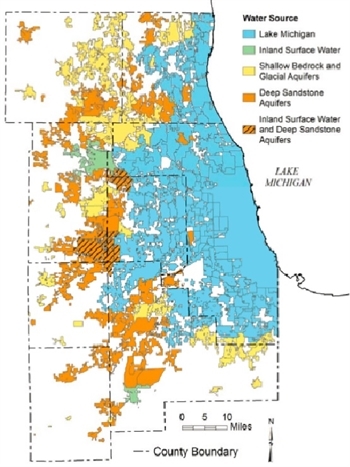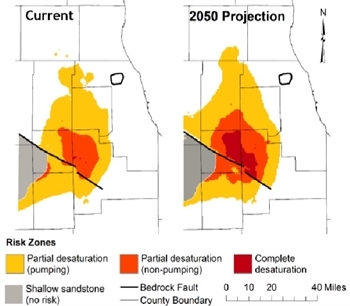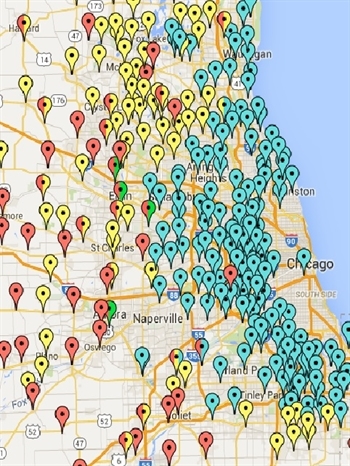
Flickr user Doran (CC)
Water issues require action by community leaders within northeastern Illinois
You know an event has hit a nerve when more than 160 mayors, county board members and water utility managers and operators from all over northeastern Illinois come together to talk about water supply. Which is exactly what happened on Thursday, May 12, in Aurora, Ill., during a forum put on by the Northwest Water Planning Alliance, Metropolitan Planning Council and City of Aurora.
The day long program, titled Heading off Crisis: Northeastern Illinois Water Supply Forum, was designed to bring elected leaders and water management experts together to discuss what the pressing water supply issues are within our region. And they stayed…the whole day.

Ill. State Water Survey
Municipalities in northeastern Illinois pull their water from a variety of resources.
The forum featured expert speakers, mayoral panelists and plenty of audience dialogue. And it highlighted the particular issues we have here in northeastern Illinois, which were so eloquently addressed by Aurora Mayor Tom Weisner who kicked off the event with a great call to action for his fellow community leaders. To view the event program and presentations, visit the Northwest Water Planning Alliance website.
I want to underscore the point that while our region generally enjoys an ample amount of water, we are not without our water supply issues. And these issues require action by community leaders within northeastern Illinois—regardless of where you source your water supply from. The list of issues includes an alarming number of communities that are at risk of running out of groundwater supply in the not too distant future; real concerns about increasing pollution in our drinking water sources; and the overwhelming need to repair and upgrade our old water supply pipes. More on those points in a moment.
Perhaps the most important takeaway from the event is the notion of power in partnership. This idea was clearly spelled out during the inspiring keynote address delivered by Pat Mulroy, international water resource expert and current senior fellow at Brookings Institution. Mulroy’s compelling message to work collectively came with a specific example from her days as general manager of the Las Vegas Valley Water District and Southern Nevada Water Authority. She shared the story behind why and how seven different water authorities within the Las Vegas basin—all operating independently and with little to no cooperation—came together to form the Southern Nevada Water Authority. The premise was simple: if they continued to act separately they were all doomed; if they partnered together they had the collective ability to not only sustain their communities, but to thrive.
What a fitting message for our region, which right now faces some tough choices about water supply service. As mentioned above, we have communities in our region that are up against supply constraints. That uncomfortable reality was spelled out during the forum when the Illinois State Water Survey presented its groundwater monitoring results, in which they explicitly stated the following:
-

Ill. State Water Survey
These maps of current and projected groundwater resource depletion in northeastern Illinois paint a dire picture.
- The effects are already being felt—high-capacity wells could be unusable in as little as 15 years;
- This is a regional problem requiring regional solutions.
Most of the outer ring suburbs in northeastern Illinois rely on groundwater, and about 90 million gallons per day are being withdrawn from the deep sandstone aquifers to supply them. These current withdrawals are at least twice the amount the Ill. State Water Survey estimates to be sustainable for future use of these sources; some areas are already experiencing significant depletion while shallower private wells are already going dry. If the current trend and practices continue, our resource modelers expect some community and industrial wells to begin going unusable within 15 years with a larger area at risk by 2050.
We also have water pollution issues. Increasing chlorides, much of which come from the road and sidewalk salt we use during winter, end up in our drinking water sources—both surface water and groundwater sources. We also have the continued, growing issue of nitrogen and phosphorus runoff as well as human waste—be it organic or from emerging contaminants such as pharmaceuticals—to contend with. All of these pollutants are getting into our water supply sources, which is cause not only for human health concerns, but the additional costs we will have to pay to clean our drinking water to safe consumption standards.
To round out the happy trilogy of our regional water supply issues, much of the infrastructure we have been using to collect, treat, pump and deliver drinking water to our homes and businesses 24 hours a day, seven days a week, is coming to the end of its useful life. Plainly put, the infrastructure is old—anywhere from 50-100 years old—and it is in need of repair and replacement in order to ensure safe and reliable service to your home and business in the future. This crumbling infrastructure issue affects all our communities, again, regardless of what water supply source you are on.
The good news is that northeastern Illinois’ water supply issues have workable solutions; we do have the fortune of tangible measures we can take to solve these issues. But it will take strong leadership from community officials in order to find the political will to collectively head off these crises.

MPC
This map shows the community water systems in northeastern Illinois.
Let me paint a picture for you of northeastern Illinois’ current water supply service. There are more than 400 community water supply systems operating in our region, most of them run by a local municipality. This means two things: First, decisions about water utility operations, asset management, planning and service rates are done at the hyper-local level by elected officials who may or may not have prior expertise in managing a water utility; and second, our region is extremely siloed and fragmented in our approach to managing a critical—indeed vital—natural resource that by its very nature is regional and shared.
We need to work together. This isn’t a luxury anymore; it’s a necessity.
The power of partnership between our communities will allow our collective numbers to negotiate and move helpful policy measures and best management practices forward at the local, state and even federal level. An equitable and regional approach to managing and planning our water resources will help ensure future supplies and infrastructure are capable of creating a bedrock from which our communities can enjoy a robust economy and high quality of life.
But we have to act collectively.
For those communities in northeastern Illinois who source their drinking water from groundwater and surface water other than Lake Michigan, there is already a group in place for you to get involved. The Northwest Water Planning Alliance was formed in September 2010 through an intergovernmental agreement between five councils of government, including approximately 80 municipalities and five counties: DeKalb, Kane, Kendall, Lake and McHenry. The goal of this water planning alliance is to provide a sustainable water supply to the groundwater- and inland surface water-dependent communities that is both economically and environmentally sound through the advancement of water policies and planning. If you are an elected official or water utility manager in this area, I highly recommend getting involved in the Northwest Water Planning Alliance to ensure your community is being proactive, and has a voice in the regional conversations happening about water supply: www.nwpa.us.
For our part, MPC has worked closely with a range of partners for more than 10 years to assist local communities and regional and state decision-makers in making the most productive use of our water through sensible planning, financing and policies. We whole-heartedly believe that while our region has considerable water assets, we risk mismanaging these assets and jeopardizing community and economic growth unless we act collectively as a region to address the issues we do face. That is why MPC is committed to continuing its support for communities and their water utilities through helpful research, opportunities for ongoing regional dialogue and collaboration, and advocacy for the use of best management practices to ensure sustainable water service within northeastern Illinois now and into the future.
The premise was simple: if Las Vegas' water authorities continued to act separately they were all doomed; if they partnered together they had the collective ability to not only sustain their communities, but to thrive.
MPC will be releasing an action agenda later this year. This succinct piece will highlight what water supply issues we face as a region, why the public should care and how to get involved and be a part of the solution. The action agenda and a companion video will be free and made available for all community leaders to use in educating their public about water supply in our region.
In addition to this resource, MPC continues to help facilitate regional dialogue and coordination (including through the Northwest Water Planning Alliance), and is identifying future initiatives we intend to roll out for the benefit of our region. One such resource will be a guide for elected officials to support them in ramping up on critical issues in water supply service, what they need to watch out for and how they can best support their utility managers.
While the May 12 water forum is over, the work continues and there is much to be done. We welcome your voice at the table.
As community leaders, it is time to see yourself not just as a water service provider, but as a water resource manager. The latter is the role our residents already expect we are doing. They trust us to keep an eye on the big picture and head off any crisis before it happens. We need to live up to that expectation by collaborating regionally and acting locally. We need to fulfill our end of the bargain and remember we are all on the same team—it’s time to employ the power of partnership.
Carpe Diem.